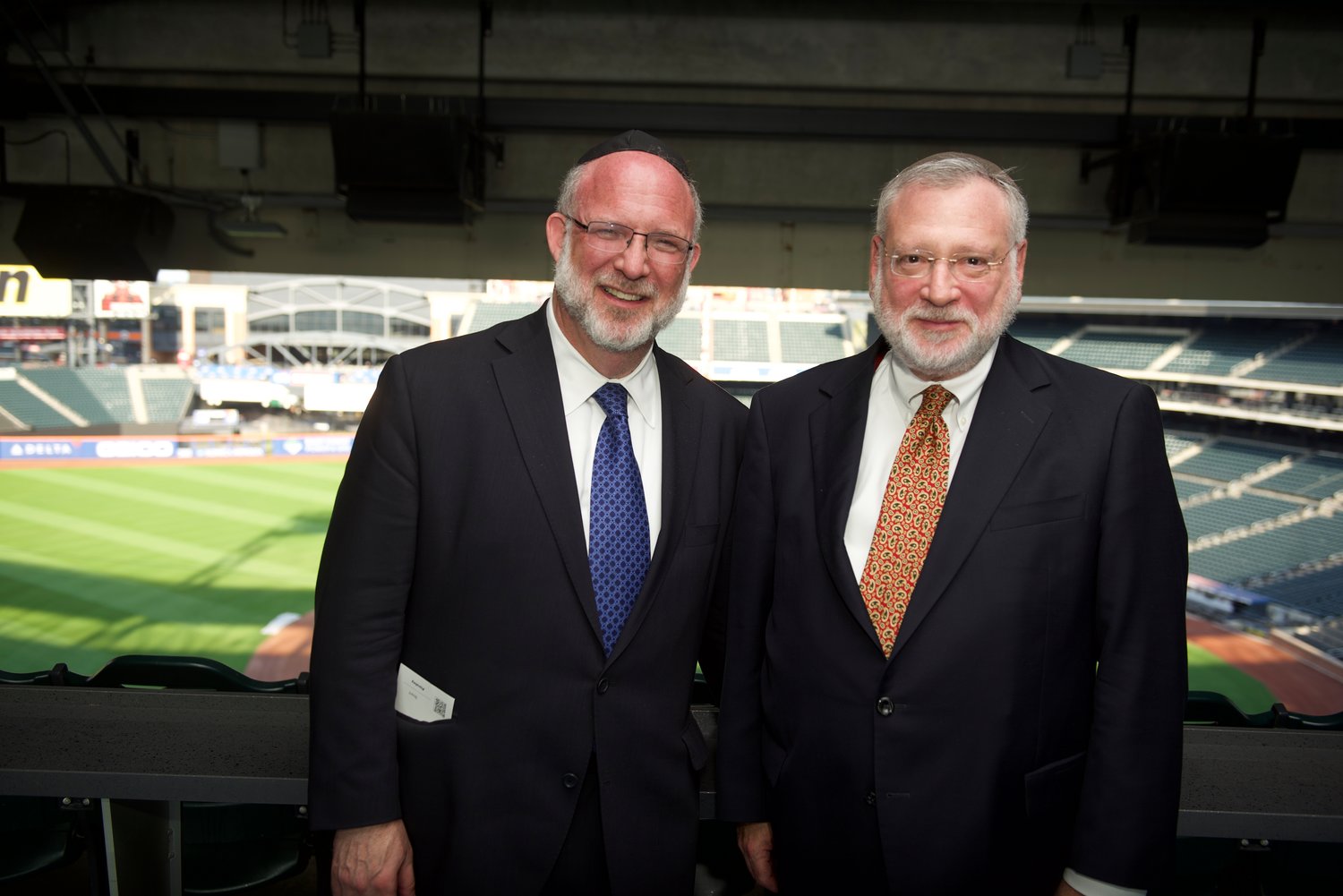Woodmere resident retires as Orthodox Union’s EVP
Allen Fagin to be succeeded by Baltimore rabbi
After two decades as a volunteer for the Orthodox Union and the past six years as the organization’s executive vice president, Woodmere resident Allen Fagin is retiring from a job for the second time.
Fagin, 70, is a lawyer who ended his first career as chairman of Proskauer Rose LLP in 2013, after 38 years in the legal field. Since being named EVP of the Orthodox Union in 2014, Fagin, working hand in hand with Lawrence resident Moishe Bane, the union’s president, has created and enhanced several programs for the Manhattan-based organization, which was founded in 1898 and serves as an umbrella group for more than 400 synagogues in its nationwide network.
Rabbi Moshe Hauer, senior rabbi of Bnai Jacob Shaarei Zion Congregation in Baltimore — who, according to OU officials, has built his synagogue into one of the most vibrant places for learning and prayer during a 25-year career — will succeed Fagin on July 1.
“I spent my entire professional life practicing law except my first year with the same law firm, and I ended my career as the CEO,” Fagin said. “When I was going to retire, I had a whole list of retirement plans. The OU executive vice president is equivalent to being CEO. I had the opportunity to accomplish a lot of things. When I took the job, I committed to staying only 18 months. Six and a half years later, I’m retiring again.”
Applying his law-firm management philosophy to his job with the OU, Fagin aimed to optimize its resources. “Things like creating a budgeting process to maximize an efficient use of our resources, and doing it in the most cost-effect way possible,” he said, adding that strategic planning included short-term goals as well as plans for up to five years, depending on the department.
Communications, data management, fundraising, information technology infrastructure, marketing, public relations and publicity were all enhanced and expanded, Fagin said. “Many of our management decisions were made by anecdote,” he said. “We were told that was a wonderful program. Now there is vigorous program review using real data and metrics, which took us in a professional direction and allowed us to grow.”
Advocating for STEM money
One of the OU’s newer programs is Torah New York. Last year, the third annual event attracted more than 2,500 people from around the world to the indoor space of Citi Field for a day of Jewish learning.
“That is another good example of expansion offering Torah education — it’s a great program,” Fagin said. “It’s yet another opportunity to provide direct services to our constituency under the OU umbrella. Our organization’s synagogue members offer a very wide range of services, and to collect in one place the luminaries to lecture on the Torah is an extraordinary experience for the thousands that attend.”
In the six years that the OU’s Teach Coalition has existed, it has advocated for nonpublic school education and helped increase funding for those schools across New York state. As Fagin pointed out, they include religious schools.
“Only 1 percent of tax dollars is going to nonpublic schools, and parents are paying property taxes and getting very, very little — it is fundamentally unfair,” he said, adding that 15 percent of children in New York attend nonpublic schools. In 2019, 338 nonpublic schools shared $5 million that the state allocated for science, technology, engineering and math programs, known as STEM education. Teach NYS, a division of the Orthodox Union’s Teach Coalition, was the primary advocate of equitable STEM money for nonpublic schools.
Bane and Fagin have known each other for decades, Fagin said, and came up through the Orthodox Union’s ranks together. They share a mutual admiration. “Allen has served as a transformative professional leader, growing the organization in creative and impactful ways,” Bane said. “His vision has not only significantly expanded OU’s reach and effectiveness, but also under his guidance and leadership, the OU has evolved into an impressively professional and disciplined institution.”
Fagin, who will stay on until September to help with Hauer’s transition, said of Bane, “It is a delight to be working with him, as he has incredible vision and is a prodigious worker on behalf of the organization.”
Hauer said he was humbled by the opportunity to become the OU’s executive vice president. “I look forward to working with Allen through this transition and develop a vision and specific plans later in the year,” Hauer said.
Creating, enhancing programs
The National Conference for Synagogue Youth, which dates back to the 1950s, was expanded under Fagin’s leadership. He noted that half of the teenagers involved are from public schools, so it’s not just yeshiva or Jewish Day School students. NCSY’s mission is to connect Jewish teens through recreational programs that aim to develop a positive Jewish identity.
“Every youth program has one eye on the present and one eye on the future,” Fagin said. “Teens today are the adults, parents, grandparents of the future. It becomes critical for their upbringing and Jewish identity. It is a transformative event for them to grow and mature.”
Last year the OU launched the Center for Communal Research, to help it make data-based decisions on programs and policy initiatives. To kick-start Jewish-run nonprofits, the Union also created Impact Accelerator, which serves as an incubator for fledging organizations. There is also the Women’s Initiative, a program offering women learning and leadership opportunities.
“Many, many people know about NCSY programs far and wide,” Fagin said. “We have many others.” The Union’s Yacahd addresses the needs of Jewish people with disabilities, and Israel Free Spirit Birthright arranges trips to the Jewish state for those ages 18 to 32.
For more on the OU, go to https://www.ou.org/.

 47.0°,
Mostly Cloudy
47.0°,
Mostly Cloudy 




